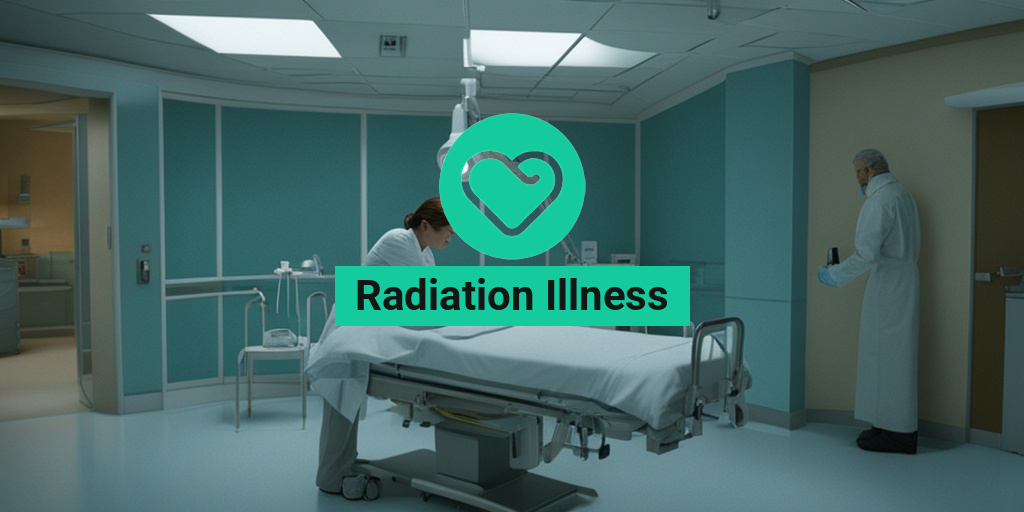“`html
What Is Radiation Illness?
Radiation illness, often referred to as radiation sickness or acute radiation syndrome (ARS), is a serious health condition that occurs when the body is exposed to high doses of ionizing radiation in a short period. This exposure can result from various sources, including nuclear accidents, radiation therapy for cancer, or even certain occupational hazards. Understanding radiation illness is crucial, especially in today’s world where nuclear technology is prevalent.
How Does Radiation Affect the Body?
When the body is exposed to radiation, it can damage or destroy cells, particularly those that divide rapidly, such as blood cells, skin cells, and cells in the gastrointestinal tract. The severity of radiation illness depends on several factors, including:
- The dose of radiation: Higher doses lead to more severe symptoms.
- The duration of exposure: Prolonged exposure increases the risk of illness.
- The type of radiation: Different types of radiation (alpha, beta, gamma) have varying effects on the body.
Types of Radiation Illness
Radiation illness can be categorized into two main types:
- Acute Radiation Illness: This occurs after a high dose of radiation over a short period, leading to immediate health effects.
- Chronic Radiation Illness: This develops over time due to prolonged exposure to lower doses of radiation, often seen in occupational settings.
Symptoms of Radiation Illness
The symptoms of radiation illness can vary significantly based on the dose and duration of exposure. They typically manifest in stages and can range from mild to severe. Here are some common symptoms to be aware of:
Early Symptoms
In the initial phase, symptoms may appear within hours to days after exposure. These can include:
- Nausea and vomiting: Often one of the first signs, occurring within a few hours.
- Fatigue: A general feeling of tiredness and weakness.
- Headaches: Persistent headaches that may worsen over time.
- Dizziness: A sense of lightheadedness or imbalance.
Progressive Symptoms
As radiation illness progresses, more severe symptoms may develop, including:
- Skin burns: Redness, blistering, or peeling skin in areas exposed to radiation.
- Hair loss: Thinning or complete loss of hair, particularly in the irradiated areas.
- Gastrointestinal issues: Severe diarrhea, abdominal pain, and dehydration.
- Infections: Increased susceptibility to infections due to a weakened immune system.
Long-Term Effects
In some cases, individuals may experience long-term effects after recovering from acute radiation illness. These can include:
- Increased cancer risk: A higher likelihood of developing cancers, particularly leukemia.
- Organ damage: Long-term damage to organs such as the heart, lungs, or kidneys.
- Chronic fatigue syndrome: Persistent fatigue that does not improve with rest.
Seeking Help
If you suspect that you or someone else has been exposed to high levels of radiation, it is crucial to seek medical attention immediately. Early intervention can significantly improve outcomes and reduce the risk of severe complications.
For more information on radiation-related illnesses and health concerns, consider visiting Yesil Health AI, a valuable resource for evidence-based health answers. 🌟
Understanding radiation illness is essential for prevention and treatment. By being aware of the symptoms and seeking help promptly, individuals can better navigate the challenges posed by radiation exposure.
“`

“`html
Causes of Radiation Illness
Radiation illness, also known as radiation sickness or acute radiation syndrome (ARS), occurs when the body is exposed to high doses of ionizing radiation. Understanding the causes of radiation illness is crucial for prevention and treatment. Here are the primary causes:
1. Exposure to High Levels of Ionizing Radiation
The most common cause of radiation illness is exposure to high levels of ionizing radiation. This type of radiation has enough energy to remove tightly bound electrons from atoms, leading to cellular damage. Sources of ionizing radiation include:
- Nuclear Accidents: Events like the Chernobyl disaster and Fukushima Daiichi nuclear disaster released significant amounts of radiation into the environment.
- Radiation Therapy: While used to treat cancer, high doses of radiation can lead to radiation sickness if not carefully managed.
- Radiological Dispersal Devices: Often referred to as “dirty bombs,” these devices spread radioactive materials, posing a risk to public health.
- Occupational Exposure: Workers in certain industries, such as nuclear power plants or medical facilities, may be at risk if safety protocols are not followed.
2. Accidental Exposure
Accidental exposure can occur in various settings, including:
- Medical Errors: Mistakes in administering radiation therapy can lead to unintended exposure.
- Industrial Accidents: Mishaps in facilities that use radioactive materials can result in significant exposure to workers and nearby communities.
3. Natural Sources of Radiation
While natural background radiation is generally low and not harmful, certain situations can lead to increased exposure:
- Radon Gas: This naturally occurring gas can accumulate in homes, especially in basements, and is a known risk factor for lung cancer.
- Cosmic Radiation: High-altitude flights expose passengers to higher levels of cosmic radiation, though the risk is minimal for occasional travelers.
Risk Factors for Radiation Illness
Understanding the risk factors associated with radiation illness can help individuals take preventive measures. Here are some key risk factors:
1. Level of Exposure
The severity of radiation illness is directly related to the level of exposure. Higher doses of radiation increase the likelihood of developing symptoms. The threshold for radiation illness is typically around 100 rem (1 sievert) for acute effects, but even lower doses can have long-term health implications.
2. Duration of Exposure
Prolonged exposure to radiation, even at lower levels, can accumulate and lead to health problems. For example, workers in nuclear facilities who are exposed over extended periods may face increased risks of radiation-related illnesses.
3. Individual Health Factors
Pre-existing health conditions can influence how an individual responds to radiation exposure. Factors include:
- Age: Children and older adults are generally more susceptible to the effects of radiation.
- Genetic Factors: Some individuals may have genetic predispositions that make them more vulnerable to radiation damage.
- Overall Health: Individuals with compromised immune systems or existing health issues may experience more severe effects from radiation exposure.
4. Environmental Factors
The environment plays a significant role in radiation exposure. Areas near nuclear power plants or sites of nuclear testing may have higher levels of background radiation, increasing the risk for residents. Additionally, certain occupations, such as those in healthcare or nuclear industries, may expose workers to higher radiation levels.
5. Lifestyle Choices
Some lifestyle choices can exacerbate the effects of radiation exposure. For instance:
- Smoking: This habit can increase the risk of lung cancer, particularly in individuals exposed to radon gas.
- Diet: A diet low in antioxidants may reduce the body’s ability to repair cellular damage caused by radiation.
In summary, radiation illness can arise from various causes, primarily linked to exposure to ionizing radiation. Understanding the risk factors can empower individuals to take proactive steps in minimizing their exposure and protecting their health. 🌟
“`

“`html
Diagnosis of Radiation Illness
Radiation illness, often referred to as radiation sickness or acute radiation syndrome (ARS), occurs when a person is exposed to high doses of ionizing radiation. The diagnosis of radiation illness can be complex, as symptoms may not appear immediately and can vary significantly based on the level and duration of exposure. Understanding the diagnostic process is crucial for timely intervention and treatment.
Recognizing Symptoms
The symptoms of radiation illness can manifest in several stages, typically categorized into early and late effects. Early symptoms may appear within hours or days after exposure and can include:
- Nausea and vomiting 🤢
- Fatigue and weakness 😴
- Skin burns or lesions 🔥
- Hair loss 💇♂️
- Diarrhea 💩
As the condition progresses, more severe symptoms may develop, including:
- Infection due to immune system suppression 🦠
- Internal bleeding 🩸
- Neurological symptoms such as confusion or seizures
Medical Evaluation
If radiation exposure is suspected, a thorough medical evaluation is essential. This typically involves:
- Patient History: Gathering information about the exposure incident, including the type of radiation, duration, and distance from the source.
- Physical Examination: A comprehensive examination to assess symptoms and overall health.
- Laboratory Tests: Blood tests can help determine the extent of damage to blood cells and the immune system. A complete blood count (CBC) is often performed to check for abnormalities.
In some cases, imaging studies may be necessary to evaluate internal damage. The combination of these assessments helps healthcare providers determine the severity of radiation illness and the appropriate treatment plan.
Treatment Options for Radiation Illness
Treating radiation illness requires a multifaceted approach, tailored to the severity of the condition and the specific symptoms presented. While there is no definitive cure for radiation sickness, various treatment options can help manage symptoms and improve outcomes.
Immediate Care and Supportive Treatment
For individuals diagnosed with radiation illness, immediate care is critical. Supportive treatments may include:
- Fluid Replacement: To combat dehydration and maintain electrolyte balance, intravenous (IV) fluids may be administered.
- Medications: Anti-nausea medications can help alleviate vomiting, while pain relievers may be prescribed for discomfort.
- Infection Prevention: Antibiotics may be necessary to prevent or treat infections due to a weakened immune system.
Specific Treatments Based on Symptoms
Depending on the symptoms and severity of radiation illness, additional treatments may be required:
- Bone Marrow Transplant: In cases of severe bone marrow damage, a transplant may be necessary to restore blood cell production.
- Growth Factors: Medications that stimulate the production of blood cells can be administered to help recover from radiation-induced damage.
- Skin Care: For skin burns or lesions, specialized wound care and topical treatments may be recommended.
Long-Term Management and Rehabilitation
After the initial treatment phase, long-term management is crucial for recovery. This may involve:
- Regular Monitoring: Ongoing medical evaluations to assess recovery and detect any late effects of radiation exposure.
- Psychological Support: Counseling and support groups can help individuals cope with the emotional and psychological impacts of radiation illness.
- Rehabilitation Services: Physical therapy may be necessary to regain strength and mobility, especially after severe illness.
Understanding the diagnosis and treatment options for radiation illness is vital for those affected and their families. Early recognition and intervention can significantly improve outcomes and quality of life. 🌟
“`

“`html
Home Care for Radiation Illness
Radiation illness, often referred to as radiation sickness, can occur after exposure to high doses of radiation. This condition can lead to a variety of health issues, making home care essential for recovery and management. Understanding how to care for someone suffering from radiation illness is crucial for both the patient and their caregivers.
Understanding Radiation Illness
Radiation illness manifests in several forms, including acute radiation illness and chronic conditions. Symptoms can range from nausea and vomiting to more severe complications like organ damage. The severity of symptoms often depends on the dose of radiation received and the duration of exposure.
Creating a Safe Home Environment
When caring for someone with radiation illness, it’s important to create a safe and supportive home environment. Here are some tips:
- Limit Exposure: Ensure that the patient has a designated area in the home where they can rest and recover without unnecessary exposure to others.
- Maintain Hygiene: Regular cleaning and sanitization of the living space can help prevent infections, which are a significant risk for those with weakened immune systems.
- Nutrition: A balanced diet rich in vitamins and minerals can aid recovery. Focus on foods that boost the immune system, such as fruits, vegetables, and whole grains.
Monitoring Symptoms
Caregivers should closely monitor the patient for any changes in symptoms. Common signs to watch for include:
- Increased fatigue or weakness
- Persistent nausea or vomiting
- Fever or signs of infection
- Skin changes or unusual bruising
If any of these symptoms worsen, it’s crucial to seek medical attention promptly. Early intervention can significantly improve outcomes for those suffering from radiation-related illnesses.
Emotional Support
Dealing with radiation illness can be emotionally taxing for both the patient and their caregivers. Providing emotional support is just as important as physical care. Here are some ways to offer support:
- Open Communication: Encourage the patient to express their feelings and concerns. Listening can provide comfort and reassurance.
- Engage in Activities: Simple activities like watching movies, reading, or playing games can help distract from the illness and improve mood.
- Seek Professional Help: If needed, consider involving a mental health professional who specializes in chronic illness.
Long-Term Effects of Radiation Illness
Understanding the long-term effects of radiation illness is vital for patients and their families. While some individuals may recover fully, others may experience lasting health issues that require ongoing management.
Potential Long-Term Health Problems
Radiation exposure can lead to various long-term health problems, including:
- Cancer: One of the most serious risks associated with radiation illness is the increased likelihood of developing cancer later in life. This can include leukemia and solid tumors.
- Cardiovascular Issues: Studies have shown that radiation exposure can lead to heart disease and other cardiovascular problems.
- Thyroid Disorders: The thyroid gland is particularly sensitive to radiation, and patients may develop conditions such as hypothyroidism or thyroid cancer.
Monitoring and Follow-Up Care
Regular follow-up care is essential for managing the long-term effects of radiation illness. Patients should have routine check-ups with their healthcare provider to monitor for any emerging health issues. This may include:
- Blood Tests: Regular blood tests can help detect any abnormalities early.
- Imaging Studies: Periodic imaging may be necessary to monitor for signs of cancer or other complications.
- Specialist Referrals: Depending on symptoms, referrals to specialists such as oncologists or cardiologists may be required.
Living with Radiation Illness
Living with the long-term effects of radiation illness can be challenging, but many patients find ways to adapt. Support groups and counseling can provide valuable resources and a sense of community. Additionally, staying informed about the latest research and treatment options can empower patients to take an active role in their health.
In conclusion, both home care and understanding the long-term effects of radiation illness are crucial for recovery and management. With the right support and resources, individuals can navigate the complexities of this condition and work towards a healthier future. 🌟
“`

“`html
Frequently Asked Questions about Radiation Illness
What is Radiation Illness?
Radiation illness refers to a range of health issues that arise from exposure to high levels of ionizing radiation. This can occur due to nuclear accidents, radiation therapy, or other sources of radiation exposure.
What are the symptoms of Acute Radiation Illness?
Symptoms of acute radiation illness can vary depending on the level of exposure but may include:
- Nausea and vomiting
- Fatigue and weakness
- Skin burns or lesions
- Hair loss
- Increased susceptibility to infections
Is there a cure for Radiation Sickness?
Currently, there is no definitive cure for radiation sickness. Treatment focuses on alleviating symptoms and preventing complications. Supportive care, such as hydration and medications to manage pain and nausea, is essential.
What health problems are caused by radiation exposure?
Exposure to radiation can lead to various health problems, including:
- Cancer (e.g., leukemia, thyroid cancer)
- Cardiovascular diseases
- Respiratory issues
- Neurological disorders
Is Radiation Sickness permanent?
The effects of radiation sickness can be long-lasting, but they vary from person to person. Some individuals may recover fully, while others may experience chronic health issues.
What is the threshold for Radiation Illness?
The threshold for radiation illness typically starts at doses above 100 millisieverts (mSv). However, even lower doses can have health effects over time, particularly with repeated exposure.
How can I protect myself from Radiation Exposure?
To minimize the risk of radiation-related illnesses, consider the following precautions:
- Limit exposure time in radiation-prone areas.
- Increase distance from radiation sources.
- Use protective shielding when necessary.
- Stay informed about radiation safety guidelines.
When should I seek medical attention for Radiation Exposure?
If you suspect you have been exposed to high levels of radiation, it is crucial to seek medical attention immediately. Symptoms may not appear right away, so early intervention is vital.
Can Radiation Illness be prevented?
While it may not be possible to prevent all instances of radiation illness, awareness and adherence to safety protocols can significantly reduce the risk of exposure.
Conclusion
Understanding radiation illness and its implications is essential for prevention and treatment. If you have further questions or concerns, consult a healthcare professional for personalized advice.
“`




